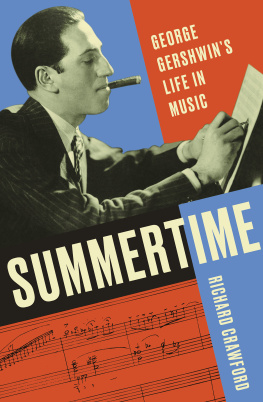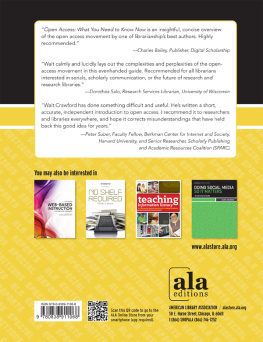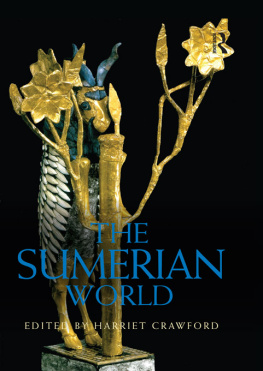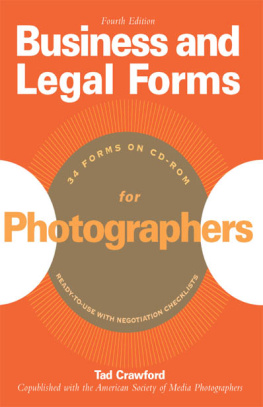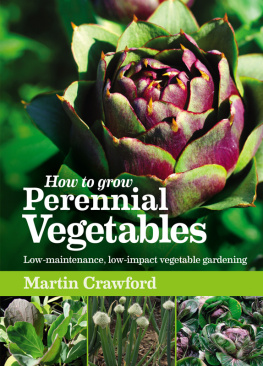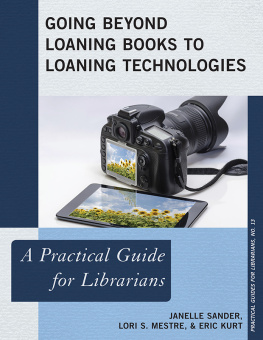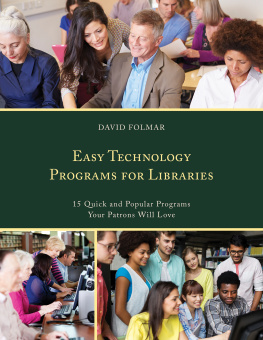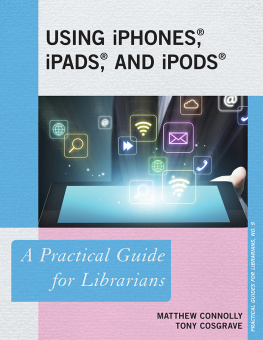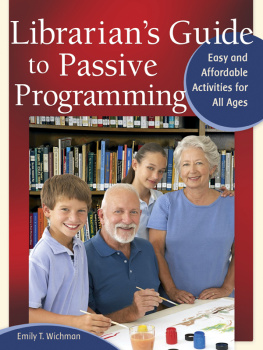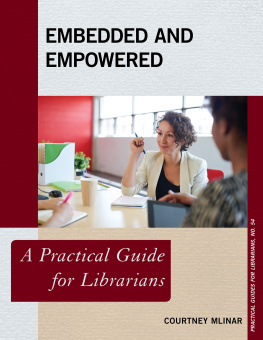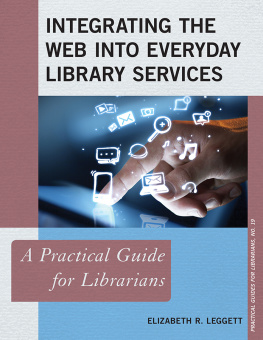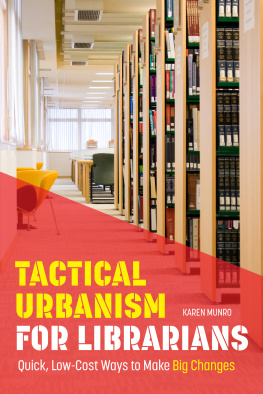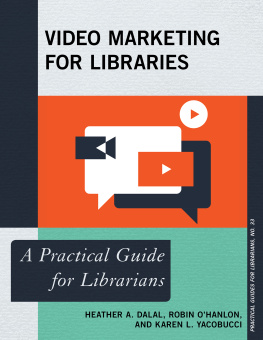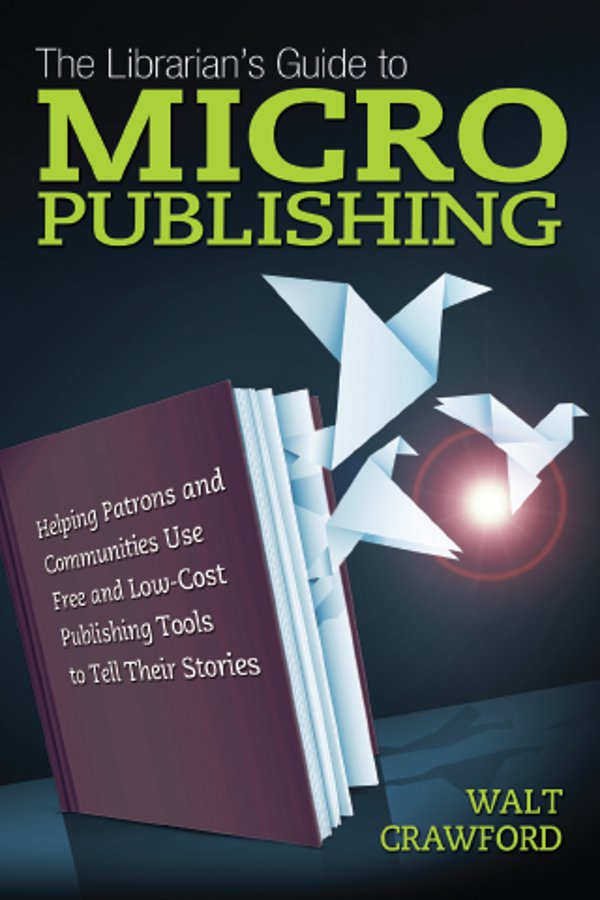
First printing, 2012
The Librarians Guide to Micropublishing: Helping Patrons and Communities Use Free and Low-Cost Publishing Tools to Tell Their Stories
Copyright 2012 by Walt Crawford
All rights reserved. With the exception provided for under Permission to Photocopy below, no part of this book may be reproduced in any form or by any electronic or mechanical means, including information storage and retrieval systems, without permission in writing from the publisher, except by a reviewer, who may quote brief passages in a review. Published by Information Today, Inc., 143 Old Marlton Pike, Medford, New Jersey 08055.
Publishers Note: The authors and publisher have taken care in preparation of this book but make no expressed or implied warranty of any kind and assume no responsibility for errors or omissions. No liability is assumed for incidental or consequential damages in connection with or arising out of the use of the information or programs contained herein.
Many of the designations used by manufacturers and sellers to distinguish their products are claimed as trademarks. Where those designations appear in this book and Information Today, Inc. was aware of a trademark claim, the designations have been printed with initial capital letters.
Library of Congress Cataloging-in-Publication Data
Permission to Photocopy: Any library or school purchasing at least one new copy of the print edition of The Librarian's Guide to Micropublishing may produce printed photocopies of .
Perfect-bound paperback ISBN: 978-1-57387-430-4
Lulu proof of concept hardbound ISBN: 978-1-57387-451-9
President and CEO: Thomas H. Hogan, Sr.
Editor-in-Chief and Publisher: John B. Bryans
VP Graphics and Production: M. Heide Dengler
Managing Editor: Amy M. Reeve
Editorial Assistant: Brandi Scardilli
Cover Designer: Lisa Conroy
www.infotoday.com
The Librarians Guide to
MICRO
PUBLISHING
waltcrawford.name/lgm
This book has an accompanying website, Librarians Guide to Micropublishing Notes and Links, at waltcrawford.name/lgm.
The website contains links to the templates discussed in this book (bk6pv.dotx, bp6pvex.dotx, the .dot versions of those templates, and the bk6lb.ott template for LibreOffice) and to resources mentioned in the book. It also links to a page providing basic information for associations that might wish to engage me for a speech or workshop on micropublishing.
The website may be enriched (either before or after this book appears in print) with additional templates, links, and resources, such as free or very inexpensive ways to convert Microsoft Word-formatted books to EPUB and Kindle formats (if I discover and test such ways) and other useful resources for micropublishers.
My personal website, waltcrawford.name, will also have a link to Librarians Guide to Micropublishing Notes and Links. You may also find occasional items related to micropublishing in my blog (Walt at Random, walt.lishost.org) or my ejournal (Cites & Insights, citesandinsights.info).
You have genealogy enthusiasts who want to publish their family histories, but the results might only be interesting to a dozen family members. At least 1 percent of your patrons, probably more, have family histories or genealogies theyd like to see in print form. Your library can help.
Beyond formal family histories and genealogies, more and more of your patrons may be gathering remembrances worth keeping and sharing: great-great-great-grandmothers narrative of crossing the plains to California or Utah. Great-great grandfathers story of growing up a slave and becoming a trusted member of the community, or mothers memories of the Civil Rights Movement. Grandfathers story of war, sacrifice, and change in the first half of the 20th century. Your generations stories of growing up with technology, being in garage bands, coping with the conflicts between social networks and privacy. Some of these are powerful family and community narratives worth preserving in book form. Your library can help.
Your community is surrounded by parks and wilderness preserves with scores of hiking trailsand more hiking and interesting walking routes in the urban non-wilderness. Members of a local hiking group have gathered comments on the most interesting (and least known) trails, including drawings and information to share those trails with other hikers. Chances are nobody outside your community and neighboring communities will care, but those within your community might find this a great resource. Your library can help.
A group of teens in your community forms a writing club to inspire one anothers creativity and review one anothers prose and poetry. At the end of the first year, they have a collection of the best works theyd love to have bound copies ofand so would their parents. Your library can help.
Local historians have produced a first-rate history of your community, but your communitys not big enough to attract a traditional publisher, given that the history might only attract 20, 30, or 300 readers. Your library can help.
Your academic library serves as the sponsoring agency for one or more open access scholarly journals using Open Journal Systems or other open source software and publishing articles on the web as PDFs, perhaps totaling two dozen papers and 400 pages for a journals annual volume. You believe a handful of libraries and a handful of authors would love to have proper print volumes of the journal, but theres no way to justify a big print run. Your library can help.
You can probably think of hundreds of other examples, cases where there are stories to be told within your communities, stories worth preserving that wont attract a big publisher and that dont justify spending thousands of dollars for a big press run. Chances are, at least one out of five of your community members has a potential book in themand at least a quarter of those potential books would be worth having for some number of readers. Your library can help.
Consider an extreme case. Someone in your community wants to gather some family stories or put together some adviceand only wants one copy, a single hardback volume to be handed down to the next generation. Your library can help.
Or another extreme: A person or group in your community is an expert in a narrow field, one so narrow that his or her expertise might only be useful for two dozen others in the worldbut it might turn out to be attractive to two thousand or more. Your library can help.
And it wont cost your library a dimeother than this book, possibly in multiple copies. Your library can enhance your community and increase the librarys role in that community by helping patrons and groups of patrons tell their stories using free and low-cost tools.
Stories come in all lengths and flavors and include fiction and nonfiction. We use stories to share wisdom and ideas as well as experiences. Everybody in your community has stories to share; many people in every community have stories that others can benefit from.
Everybody has knowledge others can learn from, and lifelong learning is one of the primary missions of public libraries. Some of that knowledge is and remains local; some begins at a local level and should be shared more broadly.
People also love to share experiencesliving vicariously but also gaining background for future adventures. Your library may already host travel presentations by community members. Cumulated experiences make great books, and micropublishing can make those books real. They can also serve our natural tendency to be interested in ourselves and those around us; local experience carries special flavor. Micropublishing strengthens a community by sharing its stories.


